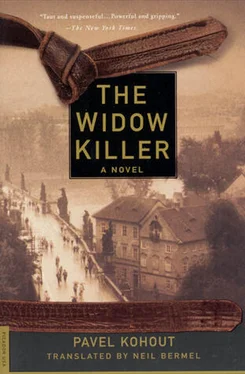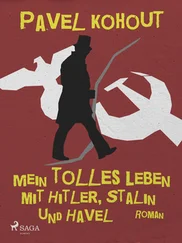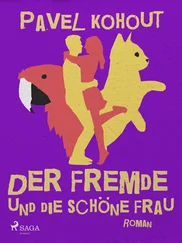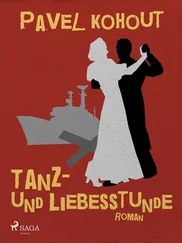“How can we avoid it? Should we lock a couple of them up? Or shoot them?”
What a waste of time, Buback thought; if he can’t even come up with a more intelligent idea….
“I’m afraid it would radicalize the Czech police; in Prague alone there are up to two thousand of them — badly armed, it’s true, but well trained.”
“So then what?”
Meckerle was evidently starting to feel bored.
“Give me a bit of time, Standartenführer. I’ll try to gain the confidence of one of the office workers, Beran’s secretary.”
The giant’s eyes once again showed interest.
“Aha. A little ’give-and-take’? At last. You’re too young and handsome to play the lifelong widower. Enjoy it while it lasts.”
“That’s exactly what I have in mind. ..”
My God, he stopped short; what am I thinking?
He recalled his first sight of the young woman: in the Czech police superintendent’s anteroom, the eyes of his Hilde had looked shyly and touchingly out at him, just like when he had seen her for the first time….
“What’s new with the deviant?” Meckerle remembered as Chief Inspector Erwin Buback stood up to take his leave.
“The most promising trail leads to Brno. I’m going there with Beran’s assistant this afternoon. Brno’s close to the front; it will be easier to assess our overall situation from there as well.”
At the very same moment as Buback was filling Meckerle in, Morava was reporting his preliminary results to Beran.
The superintendent did not interrupt with his usual treacherous questions; he followed Morava’s conclusions without taking notes, and with every page of his notebook Morava’s self-confidence grew.
“It can be asserted with almost complete confidence that the perpetrator is the very person who in 1938 committed the sadistic and still unexplained murder of a widowed seamstress, Maru  ka Kubílkova, in Brno. Regardless of differences in the implements used“—Morava raised his voice to drown out his nervousness, for this was the point where he felt his theory was most vulnerable—“it seems probable that the same perpetrator has attempted again what he failed at seven years ago, whether because of inexperience or because the first victim defended herself ferociously.”
ka Kubílkova, in Brno. Regardless of differences in the implements used“—Morava raised his voice to drown out his nervousness, for this was the point where he felt his theory was most vulnerable—“it seems probable that the same perpetrator has attempted again what he failed at seven years ago, whether because of inexperience or because the first victim defended herself ferociously.”
Even now the superintendent made no objections and took no notes. Morava was already regretting that he had closed the connecting door for fear of exposing himself to ridicule. Jitka could have witnessed his first genuine success; she could have heard his superior appreciatively pronounce that magic phrase, “Good work, Morava!”
“I conclude,” he therefore continued at an undiminished volume, “that it would be appropriate to reopen the Kubílková case. Its investigation was interrupted in March 1939 when the two officers assigned to it on the Brno criminal police fled to England after the establishment of the Bohemian and Moravian Protectorate. The file ends with the statement that all significant suspects produced alibis and no crime remotely like it has occurred since then in this country, from which they deduced that the murderer managed to escape abroad as well. Our recent investigation, however, forces me to raise the possibility that he was here the whole time and should be sought first among the ranks of the original suspects.”
He finished and, in a new wave of doubt, expected his suspiciously inactive boss to shoot him down with a glance or an observation that would reduce his careful argument to nonsense. Instead, Beran stood up, surprising him with an odd question.
“Would you like to go for a walk? The papers have been claiming for a week already that spring’s here.”
As he followed Beran out through the anteroom, Morava tried to signal Jitka with a shrug of his shoulders that he had no idea what was happening. The superintendent walked so fast that in spite of his height Morava could barely keep up. He let himself be led as far as St  elecký Island, in the middle of the Vltava River, without daring to break the silence. As the stone steps led them down from the bridge to the park path, he decided that his superior had merely wanted a breath of fresh air, and that there was no harm in asking a question.
elecký Island, in the middle of the Vltava River, without daring to break the silence. As the stone steps led them down from the bridge to the park path, he decided that his superior had merely wanted a breath of fresh air, and that there was no harm in asking a question.
“Chief Inspector Buback is waiting to hear what time we’re to leave for Brno.”
“I know,” Beran reassured him. “That’s why we’ve gone for a little stroll.”
Morava must have had a somewhat silly expression on his face. The superintendent smiled in amusement.
“You thought I wanted to show you the pussy willows blooming? Jitka can take care of that, I think.”
The assistant detective felt his burning cheeks betray him again. But Beran — uncharacteristically — clapped him on the shoulder.
“You can’t seriously think I only have eyes for corpses. My congratulations; I’m very happy for both of you. Now all you have to do is survive the war.”
“Exactly. She’s terribly afraid for her father. He’s been locked up for that illegal pig slaughter.”
“T haven’t forgotten. I’ll get to it.”
The circular path led them to the tip of the island pointing toward the Charles Bridge. In the clear air the Prague castle rose up before them, from this angle unmarred by the occupiers’ flag — not the sarcophagus of an inferior people destined for extermination, but the undying symbol of a metropolis whose glory, according to the old Czech legend, would reach the stars. Even in this distant and deserted place, Beran looked cautiously around.
“What’s your opinion of Buback?”
“He’s a capable detective… to judge by his position, at least.”
“Exactly. Kind of a big gun for a little case, don’t you think?”
Morava felt hurt, as if his own importance had just been downgraded.
“I had the impression that you were giving this matter the highest priority, sir.”
“Of course, of course,” Beran said, as if trying to soothe him. “That’s why I took the case myself. But in reality, you’re the one working on it while I continue directing daily operations. Consider that Buback runs the whole Prague office of the German criminal police; isn’t he spending a bit too much time and attention on this?”
“Not given the victim’s significance,” Morava objected. “After all, she was—”
“That’s precisely the point: she wasn’t! I put out some feelers and discovered something interesting. The Nazis were deeply suspicious of the von Pommeren family. The general’s posthumous decoration was supposed to signal that even the old German nobility supported Hitler, but there’s a rumor circulating in Prague’s German community that the Russian partisans got him just before the Gestapo did. Von Pommeren had long been suspected of supporting the ideas that led to last year’s assassination attempt on the Führer.”
“Aha.” Morava tried quickly to pick up the thread. “So they’re just feigning an interest so they can terrorize us?”
“Berlin — and State Secretary Frank here in Prague — can hardly risk inflaming the populace for no reason, given how close the front is and the way the war is going. No, Morava, the Germans’ plan is to keep the lid on us.”
“Why should they be so interested in our criminal police?”
“Because in every time and place, it’s the heart of the whole force. There’s only a handful of us, but we outlast regimes; I’m a living example. And under certain circumstances, our knowledge of the system would let us run the whole force, and not only the force.”
Morava was still in the dark.
“Under what circumstances…?”
Читать дальше

 ka Kubílkova, in Brno. Regardless of differences in the implements used“—Morava raised his voice to drown out his nervousness, for this was the point where he felt his theory was most vulnerable—“it seems probable that the same perpetrator has attempted again what he failed at seven years ago, whether because of inexperience or because the first victim defended herself ferociously.”
ka Kubílkova, in Brno. Regardless of differences in the implements used“—Morava raised his voice to drown out his nervousness, for this was the point where he felt his theory was most vulnerable—“it seems probable that the same perpetrator has attempted again what he failed at seven years ago, whether because of inexperience or because the first victim defended herself ferociously.” elecký Island, in the middle of the Vltava River, without daring to break the silence. As the stone steps led them down from the bridge to the park path, he decided that his superior had merely wanted a breath of fresh air, and that there was no harm in asking a question.
elecký Island, in the middle of the Vltava River, without daring to break the silence. As the stone steps led them down from the bridge to the park path, he decided that his superior had merely wanted a breath of fresh air, and that there was no harm in asking a question.










